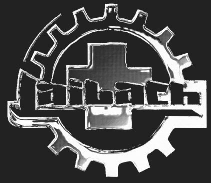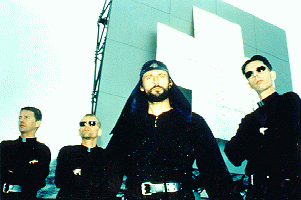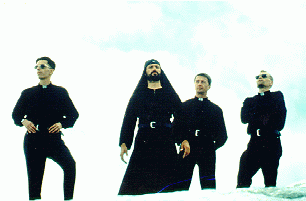

Jester: How has America changed since you last tour here?
Ivan: When I was walking through Portland, I realized that all my theories about the people in America have kind of fallen apart. Some of it is probably because Portland is a newer city and has almost a human appearance to it.
Jester: How long has it been since you have been on tour in the United States?
Ivan: 1992, when we toured for "Kapital".
Jester: Have have the audiences changed in the past five years?
Ivan: It is really difficult to say because the audience is so diverse every time we go out and tour. There is no common denomination at all. If I tried to analyze they type of audience that is consuming us it would be very difficult. The only thing that really stands out is that they are no longer as obsessed with calling us Nazi's. They have finally be able to realize that we are not German or Russian.
Jester: On you past tours you have had large light show and elaborate set designs. I heard that you has chosen for a more stripped down and sparse stage show for this tour. Is this true?
Ivan: I am still trying to figure that out myself. It has been so long since we toured that I don't quite remember all the details. I do think that we had more lights on the previous tour but I think the rest of the equipment has stayed pretty much the same.
Obviously this is an improvised tour simply because we cannot take as much equipment with us when we play overseas. For example we are going to have a production with over two hundred people in May back home and we could never duplicate that here. We also have to realize that this type of tour is mostly a promotional 'rock' type tour. We have been forced to improvise a great deal of out performance simply due to money issues.
Jester: On this new album, you choose to reinterpret Andrew Lloyd Webber's 'Jesus Christ Superstar'. Why did you choose that particular song with it's implied religious undertones?
Ivan: The whole thing really isn't about religion. Like we have always said, we have been interested in the way religion is viewed in popular culture. That song song was part of a musical that defined a certain era in popular culture. It allowed some of it's performers to become part of the establishment. It has also laid the morally and ethical groundwork for people of your generation.
 For the most part there really is a solid definition of what religion is, in
context of popular culture. Religion uses the mechanism of popular culture much
like a rock star would. The Pope uses large rallies with millions of attendees
much in the same way a rock band would. Rock stars do the same thing, except
that they try to appear as religious icons with figures of Christ appearing on
stage, and their lyrics preaching more than just the music. They both preach to
go out and 'buy' my religion or my album.
For the most part there really is a solid definition of what religion is, in
context of popular culture. Religion uses the mechanism of popular culture much
like a rock star would. The Pope uses large rallies with millions of attendees
much in the same way a rock band would. Rock stars do the same thing, except
that they try to appear as religious icons with figures of Christ appearing on
stage, and their lyrics preaching more than just the music. They both preach to
go out and 'buy' my religion or my album.
Jester: On this album, there seems to be more of a heavier guitar influence when compared to your older material. Why did you choose to move this direction musically?
Ivan: I think we are constantly circulating of sound amongst different genres. We don't want to stick to one single definition of reality. We are always trying to both return back to previous material while trying to upgrade our sound.
Jester: Are you going to be releasing any singles or videos for this new album?
Ivan: We already did. We released a single with six or seven different remixes and an accompanying video for 'Jesus Christ Superstar'.
Jester: Why do you spend a so much time incorporating other peoples propaganda, religion, and culture into your own music?
Ivan: The time in which we live is basically a time of synthesis. Everyone is doing this except that we seem to be doing it in a more original manner. The only different is the method of creation. You have to pick up the right pieces and put them together and make a new synthesis. It is definitely not a time of originality because everything has already been done. Since the beginning we have always said that originality is not something we are interested in.
Jester: What are the meaning behind the three symbols you use on-stage? The circle, triangle, and cross. Are they meant to symbolize separate NSK factions.
Ivan: The circle was something we never used. The triangle was a symbol of the theater. The cross is one of the most basic elements of any religion, culture of ideology. It is almost a universal symbol, and we hope that the way we are using it, will take away any type of ideological meaning from the symbol.
Jester: You mentioned earlier that audiences have finally stopped associating you with Nazi's. Do you still have problems with people misunderstanding your music because they simply cannot grasp the subtleties of your music?
Ivan: We never understood it as a problem. It never appeared to us be an issue. We have always said that never had a need to defend ourselves. If people choose to take that type of interpretation of our music, it is much more relevant for them that it is for us.
Jester: In the past you have mentioned you are using your music to help break down the system in which a musician must dwell to succeed. Do you feel that you have been at all successful in this endeavor?
Ivan: We have always said that an artist will always be affected by certain ideological issues that are imposed on him by the system. For example, in the former Soviet Union, art always had to meet certain rigidly defined rules for it to be allowed to exhibited. The here in the west, artists have to follow certains stylistic rules and concepts for them to ever have a chance of having their art accepted by the media. The have to use the codes of the market to be able to survive financially. They have to follow certain tastes of the consumer to be able to continue making their art. These are the very basic rules revolving around the creation of art.
 The only way to stay partly outside of this system is to speak the same
language of the ideology. The only way to survive is to change yourself into
your enemy and subvert the system. The only way to function within the system
at all is to incorporate a portion of the system into yourself. That was what
we were doing before and that is what we are doing now. We still continue to
use the language of ideology as our own language.
The only way to stay partly outside of this system is to speak the same
language of the ideology. The only way to survive is to change yourself into
your enemy and subvert the system. The only way to function within the system
at all is to incorporate a portion of the system into yourself. That was what
we were doing before and that is what we are doing now. We still continue to
use the language of ideology as our own language.
People constantly ask us how we survived through almost ten years of Communism so effectively. Basically, it was really very easily. We just took the system more seriously than it took itself.
Jester: During the past several years you have opened up the NSK to the rest of the world. Have you been successful is bringing this virtual government to the rest of the world?
Ivan: We have a lot of people around the world who have joined us. The NSK has become much bigger than it was originally ever intended. Although I don't have exact figures, I would guess that as many as 5,000 people have come to believe in our ideals as their own.
Jester: Do you consider the NSK state to be your personal form of a Utopia?
Ivan: Yes. It is based on the classical relation between artists and the state. We don't believe the existence of any concrete government. We cannot believe that or would would not be able to function. Before when Slovenia was organized within Yugoslavia as an informal state it did represent a type of Utopia system that we could use to define a relation between the artist and the state. It was easy to function because we could not go around stating that we representing a country that does not exist. Now that Slovenia has become recognized as a formal state it has become more difficult for us to exist. We have had to go and invent our own state.
Jester: Some members have likened the NSK to a virus. Yet I always felt that a virus was a bad example because I never saw the NSK as something that tried to destroy the system. It always saw it as something positive.
Ivan: Nevertheless, the NSK works like a virus. The way it takes different forms and mutates. We have never said that the NSK is a positive or a good thing. We simply are and the way we function doesn't depend on us any longer. It is something that once created, at a certain point will continue with it's own momentum.
Jester: Are you handing out applications for the NSK during your shows?
Ivan: Yes.
Jester: Good, I have been having problems with my e-mail getting returned when I have requested an application.
Ivan: It is probably because we are changing our information center. We are getting some new people and changing offices because it looks like the entire NSK is going to become much bigger. It might be part of a larger reconstruction of the entire information network.
Jester: Is there anything else you would like to add?
Ivan: Only that a tour is kind of a funny thing. It sort of
de-constructs you and reconstructs you again. It is an organic thing. We meet
all kinds of people, some of which we would like to spend a few days conversing
with, but unfortunately we cannot. Touring allows us to get a new perspective.
So please come and see the show and look for me afterwards so that we can have
a chance to talk more before we leave.